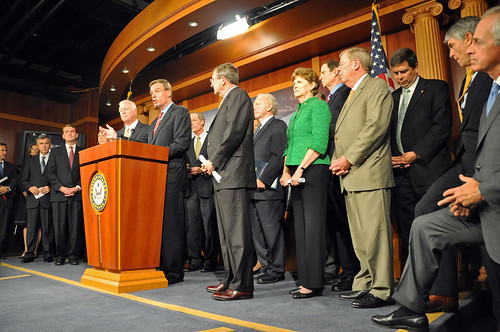Priorities
Senator Warner announces formation of bipartisan group of 36 senators to encourage super committee to "go big" on deficit reduction
~ Warner leads new Senate coalition of 18 Republicans, 17 Democrats & 1 Independent ~
Sep 15 2011
Contact: Kevin Hall: (202) 224-2023
Senator Warner today announced that he has organized a bipartisan coalition representing more than one-third of the members of the U.S. Senate to encourage the members of the congressional “super committee” to seek the broadest possible bipartisan agreement to address the nation’s deficits and debt. This group of 36 Senators -- 18 Republicans, 17 Democrats and one Independent -- builds upon Sen. Warner’s yearlong efforts, along with Sen. Saxby Chambliss (R-GA), to craft a deficit and debt framework as the two co-founders of the Senate’s bipartisan “Gang of Six.”
“Our 11th hour Gang of Six agreement to eliminate $3.7 trillion from the national debt came too late to be considered as part of the early August deadline to raise the debt limit, but the tough fiscal choices that our nation faces continue to get more difficult every day,” Senator Warner said. “The 12 members of the super committee have been tasked with reaching a bipartisan consensus on a plan to begin eliminating $1.5 trillion from our debt over the next ten years. Frankly, that’s not nearly bold enough to truly fix our nation’s balance sheet.”
“I am pleased to have partnered once again with my colleague and friend Saxby Chambliss to organize this new bipartisan group representing nearly one-third of the members of the U.S. Senate. Our coalition of 36 senators has agreed to work together to encourage the ‘super committee’ to act boldly to reach the broadest possible agreement to strengthen our economy, encourage more job creation and greater investment, and to begin putting America back on a sustainable fiscal path,” Sen. Warner said.
“We have come together today to demonstrate that there is broad, bipartisan support within the U.S. Senate for a responsible fiscal plan that cuts federal spending, reforms the tax code, and protects and strengthens our entitlement programs over the long-term,” said Sen. Warner.
“If we don’t responsibly address the debt issue now, for the first time in the history of our country, our generation is going to leave the next generation an America that is not as good and wholesome as the America we inherited,” Sen. Chambliss said. “Until we do something about it, that debt is increasing by about $4 billion a day.”
The 36 Senators have agreed to the following statement of principles:
“As a bipartisan group of Senators, we will encourage and support the Super Committee in fulfilling its mission. We are here to support a deficit reduction package consistent with the following principles that should:
- Include enough deficit reduction to stabilize the debt as a share of the economy, and put the debt on a downward path, and provide fiscal certainty. We believe a reasonable target is at least $4 trillion, including previously enacted deficit measures. This will send the right message to the financial markets.
- Use the established, bipartisan debt and deficit reduction frameworks as a starting point for discussions.
- Focus on the major parts of the budget and include long-term entitlement reforms and pro-growth tax reform.
- Be structured to grow the economy in the short, medium and long-term.
- Work to include the American public and the business community in a broader discussion about the breadth of the issues, challenges and opportunities facing us.”
The 36 participants include these members of the U.S. Senate:
Sen. Mark R. Warner (D-VA)
Sen. Saxby Chambliss (R-GA)
Sen. Lamar Alexander (R-TN)
Sen. Kelly Ayotte (R-NH)
Sen. Mark Begich (D-AK)
Sen. Michael Bennet (D-CO)
Sen. Richard Burr (R-NC)
Sen. Tom Carper (D-DE)
Sen. Dan Coats (R-IN)
Sen. Tom Coburn (R-OK)
Sen. Thad Cochran (R-MS)
Sen. Kent Conrad (D-ND)
Sen. Chris Coons (D-DE)
Sen. Bob Corker (R-TN)
Sen. John Cornyn (R-TX)
Sen. Mike Crapo (R-ID)
Sen. Lindsey Graham (R-SC)
Sen. Kay Hagan (D-NC)
Sen. Kay Bailey Hutchison (R-TX)
Sen. Johnny Isakson (R-GA)
Sen. Mike Johanns (R-NE)
Sen. Ron Johnson (R-WI)
Sen. Mark Kirk (R-IL)
Sen. Amy Klobuchar (D-MN)
Sen. Mary Landrieu (D-LA)
Sen. Joe Lieberman (I-CT)
Sen. Claire McCaskill (D-MO)
Sen. Joe Manchin (D-WV)
Sen. Lisa Murkowski (R-AK)
Sen. Bill Nelson (D-FL)
Sen. Mark Pryor (D-AR)
Sen. Jeanne Shaheen (D-NH)
Sen. Jon Tester (D-MT)
Sen. Mark Udall (D-CO)
Sen. Roger Wicker (R-MS)
Sen. Ron Wyden (D-OR)
